Scottish football is shedding its debt, but what does it all mean?
- Published
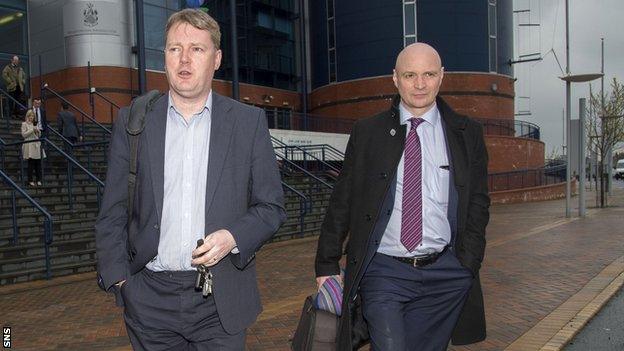
Aberdeen chief executive Duncan Fraser and Dundee United chairman Stephen Thompson
Debt has become a rarity in Scottish football.
That scenario once seemed beyond the reach of clubs that were being weighed down by the heedless spending of the past and drastic changes in the financial landscape of the game.
What has brought about this shift, though? And what does it mean to the individual clubs and the state of Scottish football itself?
There are a number of questions to ask about how the debt has been shed and what the impact might be.
Which top-flight clubs are debt-free?
In terms of bank debt, essentially all are free of long-term liabilities now that Aberdeen have reached a deal with Lloyds Bank.
Dundee United and Kilmarnock reached similar agreements last season, while Motherwell and St Mirren have been operating at more or less break even for a number of years. That said, the former often need the financial support of major shareholder John Boyle at points in the season and have been operating at a loss.
Celtic have no bank debt and their interim results for the financial year to 31 December showed a surplus in the bank, while, through long-term planning, St Johnstone, Inverness Caledonian Thistle and Hamilton Academical are all free of bank debt.
Dundee received investment from a US consortium and are now managed carefully financially, as are Partick Thistle, while Ross County's progress has been enabled by the largesse of the owner Roy MacGregor.
Celtic's most recent financial figures |
|---|
Profits rose more than £1.4m to £11.17m as the Glasgow club retained the Scottish Premiership title. |
Celtic say the 14.6% decrease in revenue to £64.74m was partly due to a discount on season tickets. |
Investment in football personnel dropped by £1.6m to £8.07m, with chairman Ian Bankier stressing that the club would continue to "live within our means". |
Year-end cash at bank position increased slightly to £3.83m (2013: £3.76. Fluctuating cash requirements meant that Celtic are now in a net debt position, which peaked at £6.5m during 2013/14). |
How how clubs managed to shed their bank debt?
Essentially, because Lloyds Bank had already written off the debts and there was no prospect of clubs ever being able to pay it back in full.
Clubs have been fortunate that when Lloyds took over HBoS in January 2009 it provided a window of opportunity for the new owners to review all the debt on the bank's books. Any that was declared bad could then be written off in the accounts.
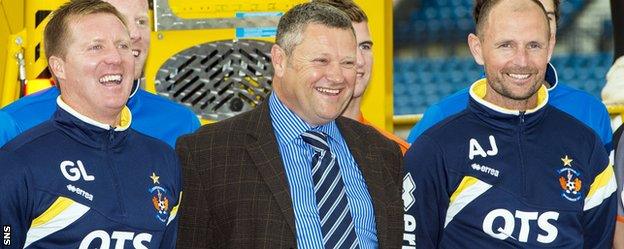
Billy Bowie (centre) has become a director at Kilmarnock after buying the Park Hotel
With Scottish football unable to generate rising income streams - indeed, the league is still currently operating without a title sponsor - clubs saddled with large debts were ultimately able only to service them.
Kilmarnock, for instance, owed £9.4m, having invested in the building of the Park Hotel next to Rugby Park. Last season, with the hotel valued at around £2.5m, it was sold to a company owned by Billy Bowie, with the businessman then converting the balance of the bank debt into equity.
As a result of the restructuring, chairman Michael Johnston's 87% stake was reduced to below 50% and he was joined on the club board by Bowie and three new investors: Jim Mann, David Moran and Russell Smith.
Kilmarnock's most recent financial figures |
|---|
Announced a deal with the Bank of Scotland in March 2014 that helped clear the club's £9.4m debt. |
The agreement will likely involve Michael Johnston stepping down as chairman at the end of the season. |
A seven-figure loan by former owner Jamie Moffat will be written off. |
Is something similar happening at Aberdeen?
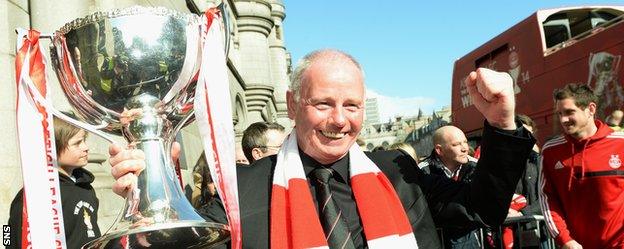
Aberdeen are set to become debt free with chairman Stewart Milne revealing a restructuring plan
Yes, the bank's debt is being bought by Willie and Elaine Donald, who own the Stonehaven-based engineering company, WM Donald.
Whatever sum the bank receives towards the approximately £9m debt is more than they expected, since in accountancy terms it was written off five years ago. The Donalds will likely convert the debt to equity at some stage and join the Aberdeen board.
By wiping out the bank debt, Aberdeen have a little more financial freedom and can direct more resources to investing in the football side of the business.
Aberdeen's most recent financial figures |
|---|
As the Dons released their annual accounts, it was revealed their net debt of £14.49m will be cleared if the restructuring plans are approved. |
Willie Donald and his wife, Elaine, who own the engineering company WM Donald, will become shareholders in the club. |
In the annual accounts, Aberdeen revealed turnover rose from £7.85m to £11.158m last season, with wages increasing from £5.256m to £6.084m. The club say that rise was the result of higher bonus payments earned by winning the League Cup. |
So Aberdeen will have more money to spend?
To an extent. The club will still have to operate at break even, since banks are no longer lending to clubs. They have to live within their means now that sources of credit have reduced or, as with the case of some clubs, disappeared completely.
There will be more money available to Aberdeen since they will not have to service the debt any more, but it will not mean a drastic increase in available finance. Manager Derek McInnes won't be about to embark upon a spending spree.
Inverness CT's most recent financial figures |
|---|
Caley Thistle posted a profit of more than £28,000 for the period to 31 May, 2014, ending up in the black for the second year in a row. |
Turnover was also up by £170,000 to £3.89m at the end of a season in which the club progressed to the League Cup final and also received compensation from Hibs when Terry Butcher and his management team departed for Easter Road in November 2013. |
The profit of £28,186 is a slight increase on the figure of £22,204 for the previous 12 months. Cash assets stand at £267,00, while the club's finances benefited further from an uptake of £25,000 in share capital. |
Have clubs benefited from being debt free?
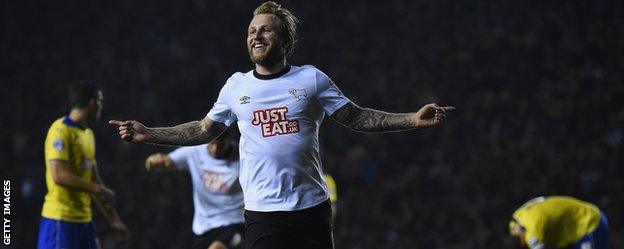
Dundee United sold striker Johnny Russell to English Championship club Derby County
Dundee United will feel less constrained now, since selling assets was part of their agreed strategy with the bank to meet repayments. There is no essential need to accept offers for young players each summer, so the club can hold out for higher fees.
The bank will have protected itself to an extent so that the debt reduction deal wasn't agreed only for the club to suddenly sell a batch of players and raise millions of pounds; percentages of future transfer fees will, until the end of next August, still go to the bank.
Similarly, other clubs will not suddenly be able to sell their stadium having just agreed to a debt reduction deal. The bank was in a position to do these deals out of necessity but also desire, since there is no wish to be involved in football any more. There are also community and social benefits to striking the deals.
Dundee United's most recent financial figures |
|---|
In February 2014, United announced a fourth profit in five years, £319,000, in their latest annual accounts. |
United managed to save more than £500,000 in wage costs and made a £595,000 transfer profit, helped by the sale of striker Johnny Russell to Derby. |
Turnover also increased to £5.4m and the wages-to-turnover ratio dropped from 76% to 61%. |
A bank debt of £4m was wiped out, partially thanks to soft loans from a group of fans. |
United had a £3.4m term loan and a £1m overdraft, but chairman Stephen Thompson and the club's board have since successfully negotiated a settlement. |
Has Scottish football benefited?
It is too early to tell, but the best case scenario is that clubs are no longer on the brink of financial collapse.
Also, there should be more leeway to try to hold on to their better young talents, although there must always be a recognition that English clubs will lure them south eventually.
It is also often good for the players' career to move to a higher level, but they can move too early and become lost in the reserve squads of clubs when staying for longer in Scottish football will help them develop and boost the game in Scotland.
Motherwell's most recent financial figures |
|---|
Posted financial loss of £184,500 for season 2012/13. |
Made a loss of £184,500 last season, despite finishing in second place for the second consecutive season. |
They say "generous bonuses" were honoured based on pre-season agreements, while league prize money for finishing second was cut by about £900,000 in January. |
- Published26 August 2014
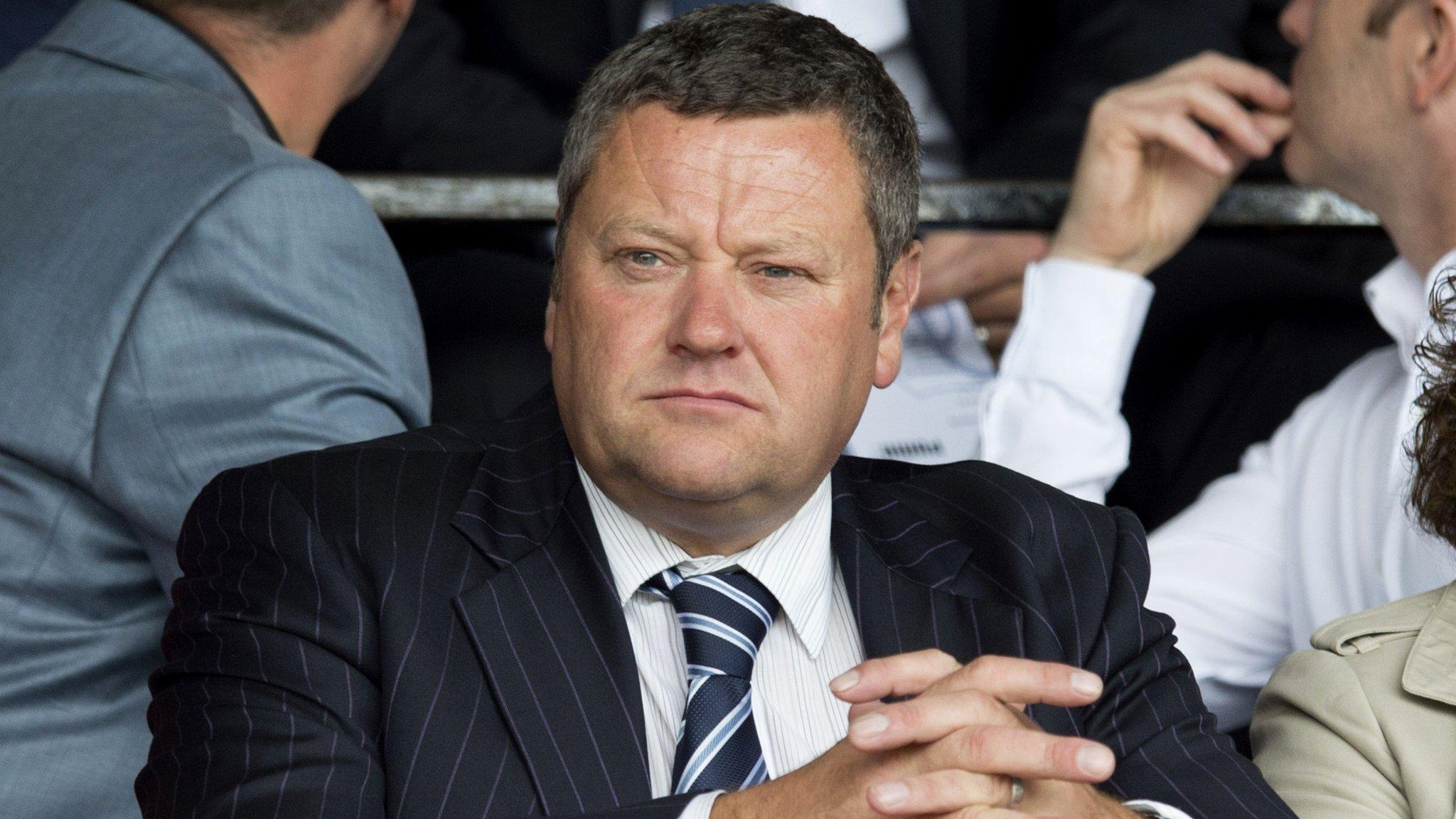
- Published1 December 2013
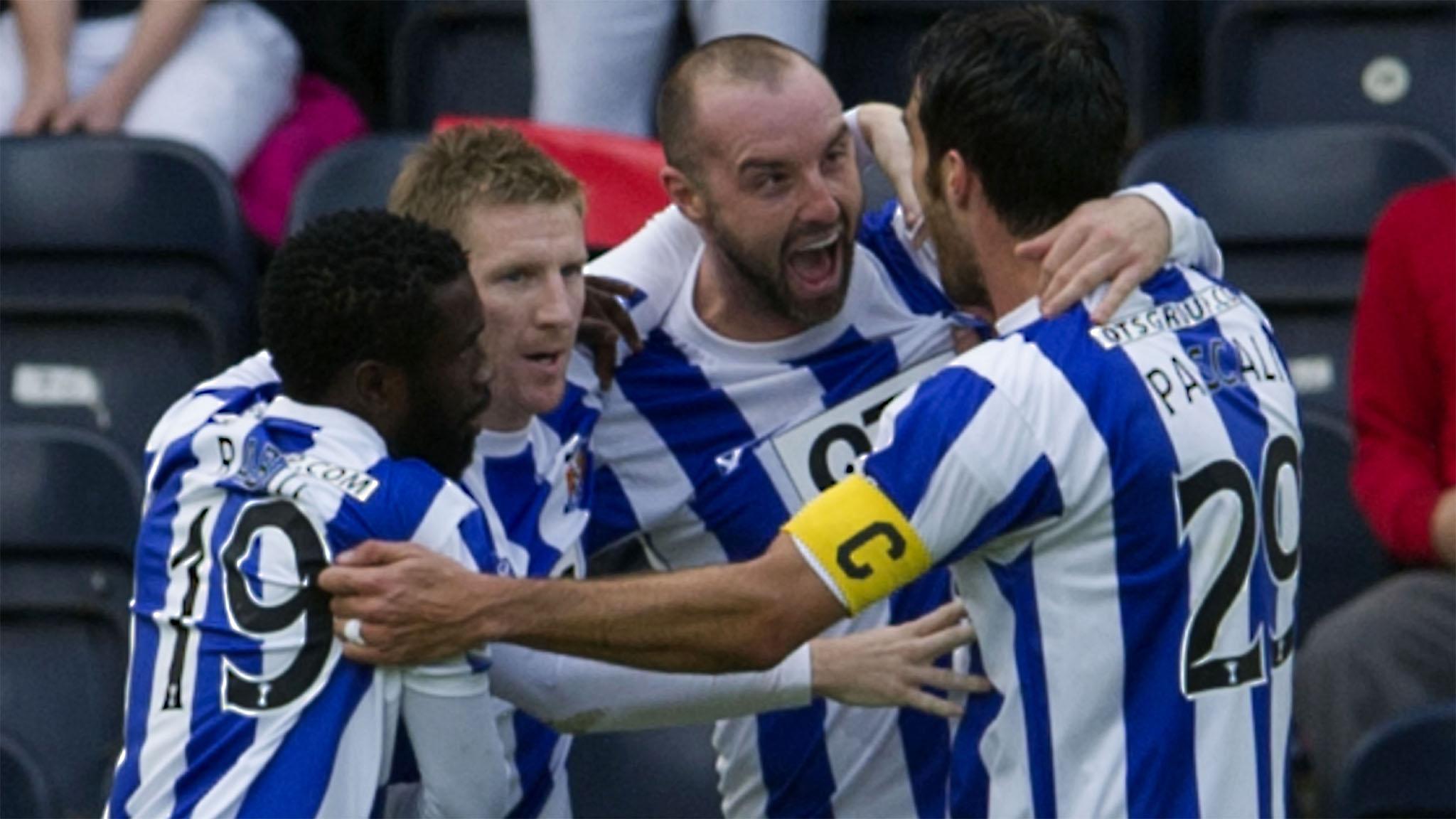
- Published12 November 2014
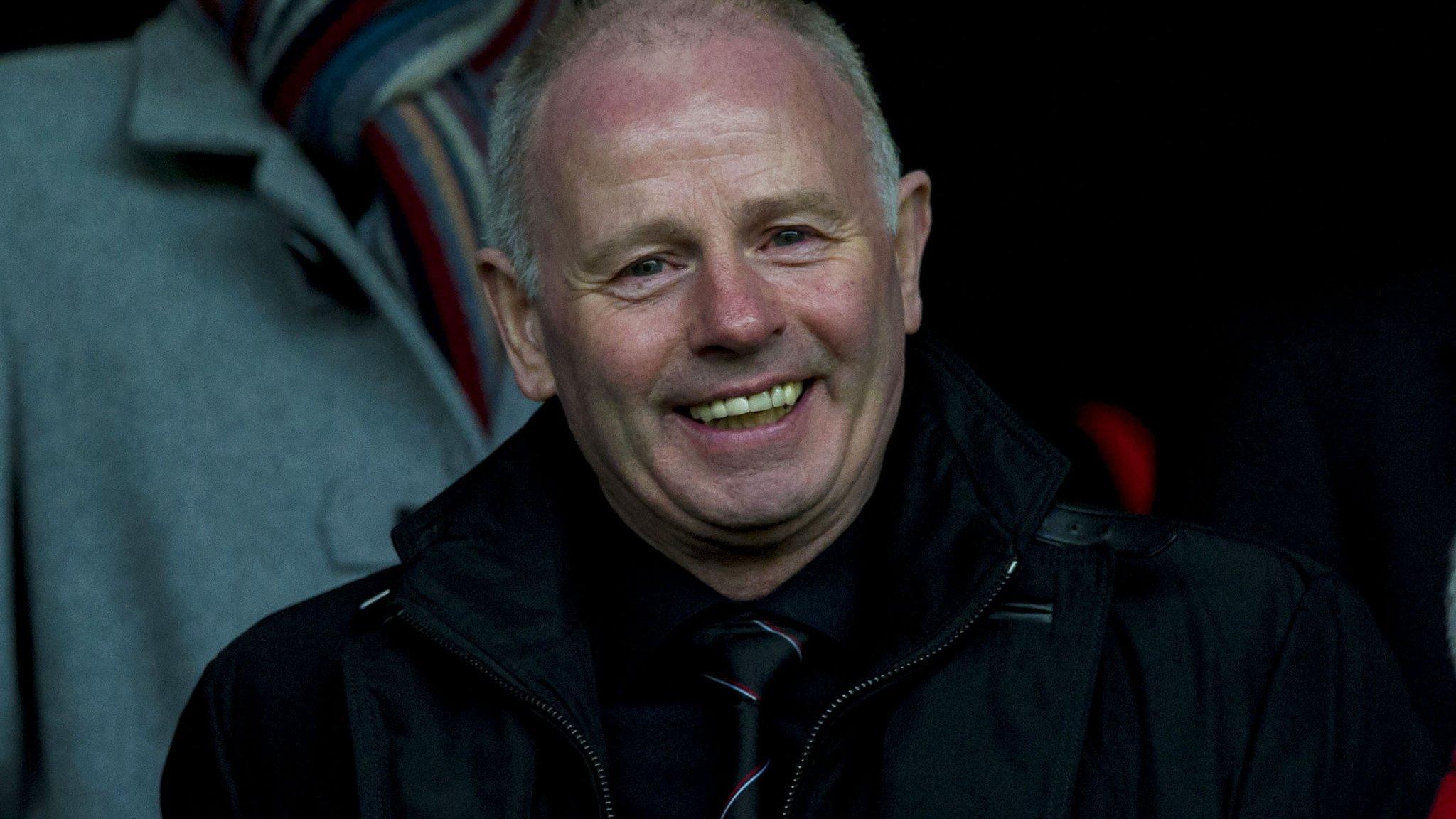
- Published7 June 2019

- Published20 June 2016
